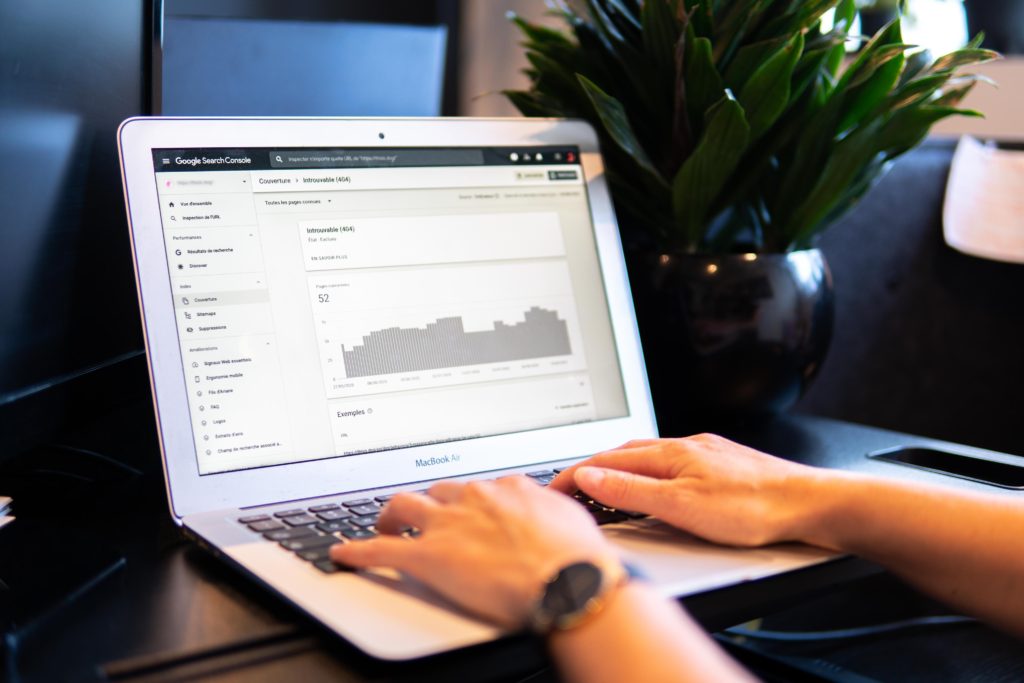It can also be difficult to understand how to rank on search engines, which is why we are breaking down some essential SEO tips for small businesses and providing actionable SEO tips for beginners to help you navigate the complexities of search engine optimization and improve your online visibility.
When it comes to being number one, SEO knows how to get it done.
Also known as Search Engine Optimization, having an intensive SEO strategy not only influences the placement of results on search engine pages like Google and Bing!, it plays into the likelihood of users visiting your website. It is key to the internet and essential for any business, big or small.
In this post we will…
- Define SEO
- Explore how it works, including the specifics of on-page and off-page SEO
- Learn why you should prioritize SEO
- And examine six things you can do right now
What is SEO?
Search Engine Optimization (SEO) is the practice of increasing the quantity and quality of traffic to your website through organic search engine results. Search engines include Google, Bing!, and Yahoo!, all of which are used to pursue an answer.
SEO increases website visibility, which in turn, increases website traffic, credibility, sales, and much more.
How does SEO work?
The best way to understand SEO is to start with understanding the source: aka, the search engines themselves.

There are billions of potential results to every search. Search engines filter through these to find the most compatible answers using web crawlers. These search engine spiders sift through keywords, backlinks, location, page context, and more to determine which pages are best suited for a user.
This information is offered on the Search Engine Results Page (SERP). But how do you get on the SERP?
As mentioned briefly, there are several influential factors to SEO that fit into two categories: Off-Page SEO and On-Page SEO. Both are important, and when used together, they create a ladder to help your webpage scale the SERP.
Off-Page SEO
Off-Page SEO consists of actions taken outside of your own website to impact your rankings within search engine results pages. This includes: referral links, articles, social media, and reviews.
The primary focus of Off-Page SEO is to add credibility to your webpage. Why do this? Because when a site has reputable sources suggest or approve of its content, search engines register this almost as a background check. It is “community approved” and deemed as a reputable source in and of itself.
On-Page SEO
On-Page SEO is the practice of optimizing web pages for specific keywords in order to improve search visibility and traffic. This is the more commonly known side of SEO that includes: site content, keywords, internal linking, title and meta optimization, and image optimization.
If you are just starting with SEO, one of the easiest things you can do is add links throughout your site. These should be a combination of internal and external links.

Keywords are another well-known part of SEO. They are one-word stakeholders that define the ideas and topics in your content and webpage. These are the reference words web crawlers catch on and take note of for their search index, hence why they are so important.
Lastly, to no surprise, the titles of your web pages also influence which are selected by web crawlers. They are another place for keywords, same with the meta descriptions—the one-paragraph summary under each result on a web page.
Why Should You Care?
The first three results on a SERP are usually ads. This may prompt the question: If you can buy your way to the top, why care? The answer: many reasons.
Organic Suggestion
Users are more likely to trust an organic result over a purchased result. Why? Organic credibility. Again, there are over a billion potential results for every request. Being on the first page out of thousands of other pages is a promise for quality.
Yes, you can buy your way to the top. But what is the likelihood of a user selecting your ad over an organic result?
Increase of Quality
When you focus on SEO, you hone in on your industry and the keywords for your niche. Use them strategically, and not only do you gain an upper leg in the SERP, you gain dominance in your industry.
Increase of Quantity
Looking for more customers and engagement? An efficient SEO strategy garners more search results, more search results = more website traffic, more website traffic = more customers and page interaction.
SEO from a consumer’s perspective
One of the most common misconceptions we hear from business owners: “I’ve Googled my company and I showed up on the first page. I don’t need SEO.”
As discussed, there are many factors that play into SEO, and just because your business shows up first on your search, does not mean it will to the general public.

Consumers search with a few keywords.
They may not know the name of your business. They may only be searching “custom jewelry” or “sustainable and body-positive swimwear”. Which results come up is entirely determined by SEO, and if related keywords aren’t strategically integrated throughout your webpage, the likelihood of your business being recommended is slim.
Ads come first.
Search something. Anything. Look at the first three results. More likely than not, they are ads, sites that paid search engines to show up first for a collection of keywords and searches.
Regardless of what consumers search, paid content always dominates the first three results. That means three spots are already taken, making the available result slots are few and highly desirable. The better your SEO is, the more likely you are to take one of those positions.
Local results come next.
Search engines focus on convenience for its users. Oftentimes that equates to the user’s proximity and if you aren’t a “customer jeweler” or “sustainable body-positive swimwear brand” within a thirty mile radius, search engines will favor you less than those that are.
Then organic results.
This is where you come in. With the right SEO strategy, you will hold ranks against the above, and play into the list of organic results.
Common SEO Myths
SEO is the “problem.”
In truth, many factors play into where a webpage stands on the search engine results page beyond SEO. For example, content and website structure. If your webpage lacks text and isn’t user-friendly, web crawlers are less likely to recommend your site to their users.

There is a consistent “#1”.
Search engine algorithms are frequently updated, and as a result, search engine result pages fluctuate. The webpages at the top one day, might not be the same a week or a month later. This is why it is important to not only establish an SEO strategy, but to regularly update and maintain it according to analytics.
Local SEO doesn’t matter anymore.
Online businesses have skyrocketed in popularity over the last decade. Many of these businesses don’t and never will have a brick-and-mortar storefront. However, this doesn’t mean having a location attached isn’t important.
One of the main judgement factors of web crawlers judge webpages on is location. Having a location attached to your business can boost your SERP standing AND the number of SERP you appear on.
Six things you can do right now.
For those looking to get started on improving their SEO, there are several easy things you can do:
Identify your brand.
Think of 10 words to describe your products and services. These can be related to your industry and to the niches you cater to, or the topics and issues you focus on.
These words will be used for keywords.
Search for potential keywords.
Any business owner knows the importance of understanding your market. Take the time to search the keywords you’ve brainstormed and analyze the results.
Name three competitors.
From the keyword results and/or from your overall market analysis, identify three competitors and look into what keywords and content could influence their SEO standing.
Review your website.
Now that you have done some research, look at your own website and make note of places where you can improve with SEO. This can be places where you can integrate backlinks, filling out meta descriptions for each of your pages, copy with language that can be traded for keywords, etc.
Focus on local SEO.
Even if you are a solely online business, set up a Google My Business page and connect your website to a location to optimize your potential search results.
Set up Google Analytics.
As mentioned earlier, search engine algorithms are constantly changing. On average, it takes three months to understand what is and isn’t working with SEO. The best free software to track SEO success is Google Analytics.
Ready to Magnify?
Take the hassle out of SEO through our Search Engine Optimization service. Book your FREE 20-minute consultation today to get started optimizing your website.

